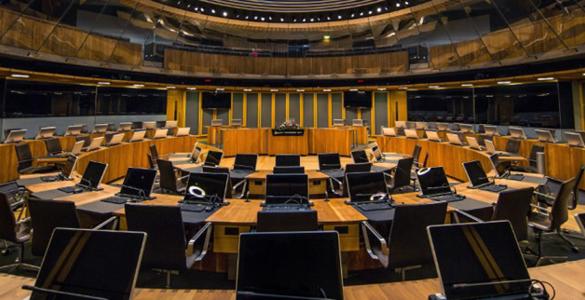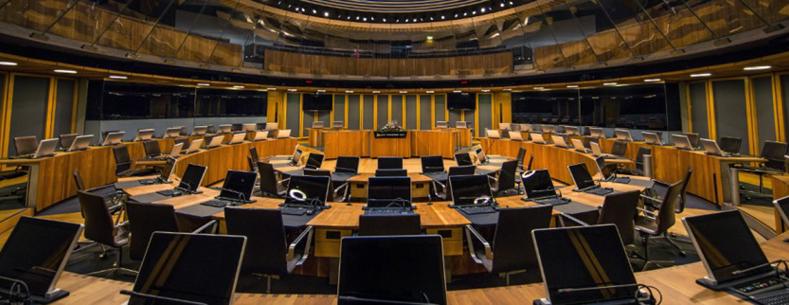When the UK Parliament wishes to legislate on a subject matter that is devolved to the Senedd, it will not normally do so without the consent of the Senedd. This is known as the legislative consent (or Sewel) convention.
So far in the Sixth Senedd, the Welsh Government has laid legislative consent memorandums for 17 UK bills. This is more in seven months than any year except 2020. The picture continues to evolve as bills are amended and supplementary legislative consent memorandums are laid to reflect those amendments.
The consent memorandums laid so far during this Senedd cover around 360 clauses and schedules. By comparison, in the first year of the Fifth Senedd (May 2016 to May 2017), the Welsh Government laid consent memorandums for 10 bills, covering only about 80 clauses and schedules.
This Wednesday, the Senedd will be debating a motion on the increase in numbers of legislative consent memorandums. This article looks at the Welsh Government’s approach to legislative consent and how the Senedd has responded.
The Welsh Government’s approach to seeking Senedd consent
The Welsh Government has asked the Senedd to consent to 11 UK bills (in full or in part), rather than bringing forward its own bills to the Senedd. For example, the Welsh Government is seeking consent to:
- about 30 clauses in the Animal Welfare (Kept Animals Bill);
- more than 30 clauses in the Building Safety Bill.; and
- all clauses in the Leasehold Reform (Ground Rent) Bill.
In September, the Counsel General shared a set of Welsh Government principles for UK bills with the Senedd’s Legislation, Justice and Constitution (LJC) Committee. This document says that the Welsh Government “follow[s] the principle that primary legislation in devolved areas should be enacted by the Senedd” – but that it is sometimes “sensible and advantageous” to use UK bills instead.
The LJC Committee has raised concerns about the Welsh Government’s reasons for recommending consent to UK legislation, including:
- allowing the UK Parliament to pass major new legislation for Wales in important devolved areas, and so preventing the Senedd from carrying out legislative scrutiny (for example, the Environment Bill (now Act) and the Animal Welfare (Kept Animals) Bill); and
- missing opportunities to develop a consolidated, bilingual body of Welsh law, and so running counter to the Welsh Government’s programme to make Welsh law more accessible (for example, the Building Safety Bill).
In evidence to the LJC Committee, the Counsel General said that “the demands on our capacity to legislate have increased”, partly as a result of the need to legislate for leaving the EU and the COVID-19 pandemic.
The Welsh Government’s approach to recommending against Senedd consent
The Welsh Government has recommended against Senedd consent (in full or in part) to eight of the bills for which legislative consent memorandums have been laid in this Senedd.
In some cases, this is because of differences in policy between the UK Government and the Welsh Government. For example, the Welsh Government disagrees with provisions in bills setting up post-Brexit regulatory frameworks for subsidy control and for the recognition of professional qualifications, as well as reserved elections and criminal justice.
The Welsh Government has also raised concerns about how provisions in some UK bills will affect how the Welsh Government and the Senedd can exercise their powers, including:
- restricting the use of devolved powers: for example, the Welsh Government says the Subsidy Control Bill would “undermine the long established powers of the Senedd and Welsh Ministers to act in relation to matters within devolved competence such as economic development, agriculture and fisheries.”
- setting duties on devolved institutions: for example, the Welsh Government said that the Health and Care Bill, as introduced, would allow the Secretary of State to make regulations that could confer functions or obligations on devolved Welsh authorities.
- limiting Senedd accountability: for example, the Welsh Government says the Elections Bill would enable the Secretary of State to publish a strategy and policy statement for the Electoral Commission. If a draft statement relates to the Commission’s devolved Welsh functions, the Secretary of State must consult the Welsh Ministers. The Welsh Government argues that this is not compatible with the Electoral Commission’s accountability to the Llywydd’s Committee in the Senedd for devolved functions.
Delegating powers to Ministers
The LJC Committee has also raised concerns about the implications of some UK bills for Senedd accountability, and particularly the way that bills delegate powers to UK and Welsh Ministers.
The Welsh Government’s principles for UK bills state that delegated powers in devolved areas should be conferred only on the Welsh Ministers. However, the LJC Committee has raised concerns about the delegation of powers in UK bills, including bills:
- granting powers to UK Ministers only in devolved areas: for example, the Committee raised concerns about provisions in the Police, Crime, Sentencing and Courts Bill to grant the Secretary of State powers to make regulations and issue guidance in devolved areas relating to the serious violence duty.
- granting concurrent or concurrent-plus powers to UK and Welsh Ministers, for example in the Environment Bill (now Act) and the Professional Qualifications Bill. Concurrent powers are powers that can be exercised by the Welsh Ministers or UK Ministers to make secondary legislation in relation to Wales. Concurrent-plus powers are concurrent powers that UK Ministers can only exercise with the consent of the Welsh Ministers.
- granting Ministers Henry VIII powers, for example, in the Professional Qualifications Bill and the Health and Care Bill. Henry VIII powers allow Ministers to amend primary legislation by regulations. The Committee has raised particular concern about the granting of Henry VIII powers to UK Ministers that would allow them to amend the Government of Wales Act 2006 by regulations.
- enabling UK Ministers to implement international obligations by secondary legislation: where international agreements require changes to domestic legislation, it is conventional that primary legislation is used. However, the Committee raised concerns that provision in the Health and Care Bill to allow the Secretary of State to implement international healthcare agreements by secondary legislation would constitute a departure from that constitutional convention.
Committees in the UK Parliament have also expressed concerns about the UK Government’s approach to creating new delegated powers, with the House of Lords Secondary Legislation Scrutiny Committee and Delegated Powers and Regulatory Reform Committee recently warning of bills delegating extensive new powers to government.
Next steps
You can find more information about legislative consent memorandums laid before the Senedd, committee scrutiny and debates on consent motions in Plenary on the Senedd website. Our constitutional quick guides provide further background.
The Senedd will continue to consider supplementary and new legislative consent memorandums as bills are introduced and taken through the UK Parliament in the new year.
Article by Lucy Valsamidis, Senedd Research, Welsh Parliament






